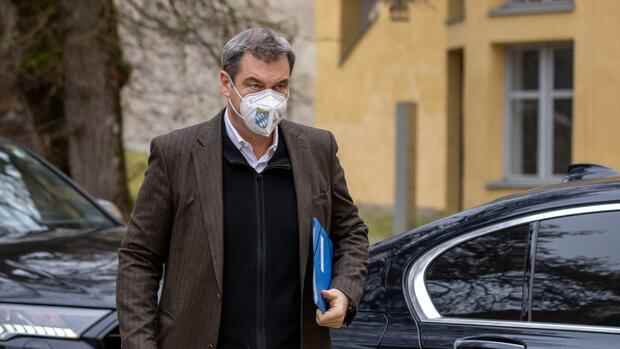Bavaria’s Prime Minister calls for a new emergency brake after the ruling from Karlsruhe.
(Photo: dpa)
Berlin / Karlsruhe In the third wave of pandemics in spring, the federal government was allowed to impose exit and contact restrictions via the corona emergency brake. The Federal Constitutional Court announced this on Tuesday morning. The decision has a direct impact on the pandemic policy of the federal and state governments. Shortly after the decision, a dispute between the executive federal government and the upcoming traffic light coalition became apparent.
Bavaria’s Prime Minister Markus Söder sees the judgment of the Federal Constitutional Court as “the basis for a new federal emergency brake”. All those who tried to draw a different picture are now refuted writes the CSU politician on Twitter. “Confirmation all along the line.” Söder warns: “We have to act quickly now.”
The acting minister of the Chancellery, Helge Braun, is in the same direction: “For days I have been calling for a formal conference of prime ministers and for us to agree on an emergency brake,” he said.
However, Braun braked expectations of the federal-state consultations on Tuesday afternoon. “There are no resolutions planned for today. That was the prerequisite for the meeting, “said the CDU politician to the broadcasters RTL and N-TV, referring to the vote with the SPD side.
Top jobs of the day
Find the best jobs now and
be notified by email.
The FDP domestic politician Konstantin Kuhle, on the other hand, warned against an automatic mechanism for a new emergency brake and sees differences in the pandemic situation today and at the time of the introduction of the “federal emergency brake”: “The fact that the legislature was allowed to introduce exit restrictions in April 2021 does not mean that the legislature must introduce exit restrictions in December 2021 “, writes the member of the Bundestag on Twitter.
The acting Federal Health Minister Jens Spahn (CDU) is confident, however, that the judgment “also offers orientation to the parties who have ruled out more stringent measures due to legal concerns,” said Spahn in Berlin. However, the judges’ decision is “not a license for arbitrary interference with fundamental rights”. Nationwide restrictions on public life would have to be limited in time, differentiated regionally and be based on the pandemic.
Green for regional lockdowns
The Greens health expert Janosch Dahmen welcomed the legal certainty for additional protective measures in order to now consistently fight the fourth wave, wrote the member of the Bundestag on Twitter. It would be necessary to implement further measures quickly.
“We need a uniform partial lockdown in many regions of the country,” said Dahmen previously to the German press agency. This does not mean general, but targeted closings where the situation is out of control. “Schools and daycare centers should, however, remain as open as possible with masks and daily tests.” For unvaccinated people, there should be contact restrictions in private as in the first lockdown.
In addition to access rules only for vaccinated and convalescent (2G) and for vaccinated, convalescent and tested (3G) in shops, work and traffic, catering, bars, discos and the prohibition of larger events are necessary – including the audience at Bundesliga games.
More: All developments on the corona pandemic in the Handelsblatt news blog.
